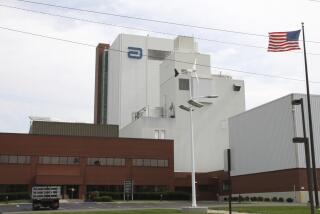Infant milk powder is latest worry in China
BEIJING — Like most parents, Dong Zhenqing and his wife wanted only the best for their infant son. So they fed him Bei Bei infant formula from Sanlu, a famous Chinese brand with impressive health claims and top celebrity endorsements.
When he was 4 months old, however, Tianyu developed a high fever, swollen stomach and urinary problems. He was diagnosed with kidney stones and borderline renal failure.
The couple initially suspected his drinking water, and then, on meeting other parents in similar straits, zeroed in on his infant formula.
Sanlu, China’s largest milk powder maker, recalled 700 tons of formula, said the China Daily newspaper, after an infant died and more than 50 developed kidney stones.
The government Friday promised an investigation and said those responsible would face “serious punishment.”
Melamine, used to make plastic and tan leather, has been linked to the health problems. It sometimes has been used by Chinese companies to make food appear protein-rich. The chemical also was involved in a massive pet food recall last year after dogs and cats in the U.S. fell ill or died.
Regulators say none of the milk powder was legally exported to the U.S., though the Food and Drug Administration is concerned that some might be available in ethnic markets.
Although tainted exports get the most attention, domestic consumers often suffer the most from contaminated products, and this incident illustrates the lack of trust many Chinese feel in this rapidly changing society and economy. It follows repeated vows by the government to improve food and product safety after a string of scandals last year that, besides pet food, involved toys, toothpaste, seafood and medicine.
“People need to be told so innocent children can be saved from this milk powder,” said Tianyu’s 34-year-old mother, who identified herself only by her surname, Chen.
She said she chose Sanlu in part because her mother was impressed by the brand’s nationwide distribution. Sanlu controls almost 20% of the market and was recently named the milk powder supplier for China’s space program.
Chen’s family lives in Nanchang, the capital of eastern Jiangxi province. When she suspected a problem, she said, she called a health hotline in Shanghai only to get the runaround on which agency was responsible. She gave up.
Sanlu has suggested that production was inadvertently contaminated sometime before Aug. 6. Chen said she suspected the contamination was more willful.
“Since it’s a big company, maybe someone is protecting them,” she said.
New Zealand-based farmers group Fonterra Co-operative holds a 43% stake in Sanlu. That was one reason some consumers said they assumed it was a trustworthy brand.
Fonterra executives could not be reached for comment. Desmond O’Toole, an adjunct professor of chemistry at the City University of Hong Kong, said melamine shouldn’t be anywhere near a milk factory.
Foreign companies such as Fonterra that form partnerships with Chinese companies have to be careful, he said, particularly if they don’t control the production process.
“Anything you’re going to buy from China, you have to test everything,” he said. “You can’t assume anything.”
Standards in the domestic market are far lower than for exports. “It won’t change overnight,” said Hongjun Zhang, a former Chinese regulator who is an attorney with the law firm Holland & Knight in Washington and Beijing. “Even I find if I buy something and it’s not good, I don’t always realize it or think to complain.”
In the case of milk products, experts said, China relies on a traditional process of estimating protein by measuring nitrogen content. Melamine is a nitrogen compound, and adding it to dairy products can skew the test results.
After passing several painful kidney stones, Chen said, her son appears to be on the mend, though he’s still working out some smaller stones.
--
More to Read
Inside the business of entertainment
The Wide Shot brings you news, analysis and insights on everything from streaming wars to production — and what it all means for the future.
You may occasionally receive promotional content from the Los Angeles Times.










